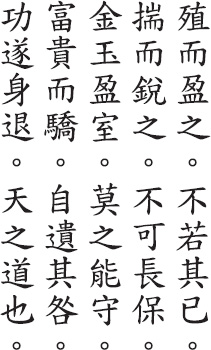9
 |
Instead of pouring in more better stop while you can making it sharper won’t help it last longer rooms full of treasure can never be safe the vanity of success invites its own failure when your work is done retire this is the Way of Heaven |
THE HOUHANSHU says, “What Lao-tzu warns against is ‘pouring in more’” (see the Houhanshu’s Lao-tzu biography).
HSUN-TZU says, “In the ancestral hall of Duke Huan, Confucius reports watching an attendant pour water into a container that hung at an angle. As the water level approached the midpoint, the container became upright. But when the attendant went beyond the midpoint, it tipped over, the water poured out, and only after it was empty did it resume its former position. Seeing this, Confucius sighed, ‘Alas! Whatever becomes full becomes empty’” (Hsuntzu: 28).
LU TUNG-PIN says, “This verse is about the basics of cultivation. These are the obstacles when you first enter the gate.”
LIU SHIH-LI says, “Since fullness always leads to emptiness, avoid satisfaction. Since sharpness always leads to dullness, avoid zeal. Since gold and jade always lead to worry, avoid greed. Since wealth and honor encourage excess, avoid pride. Since success and fame bring danger, know when to stop and where lies the mean. You don’t have to live in the mountains and forests or cut yourself off from human affairs to enter the Way. Success and fame, wealth and honor are all encouragements to practice.”
YEN TSUN says, “To succeed without being vain is easy to say but hard to practice. When success is combined with pride, it’s like lighting a torch. The brighter it burns, the quicker it burns out.”
WANG CHEN says, “To retire doesn’t mean to abdicate your position. Rather, when your task is done, treat it as though it were nothing.”
SSU-MA CH’IEN says, “When Confucius asked about the ceremonies of the ancients, Lao-tzu said, ‘I have heard that the clever merchant hides his wealth so his store looks empty and that the superior man acts dumb to avoid calling attention to himself. I advise you to get rid of your excessive pride and ambition. They won’t do you any good. This is all I have to say to you’” (Shihchi: 63).
HO-SHANG KUNG says, “Excessive wealth and desire wearies and harms the spirit. The rich should help the poor, and the powerful should aid the oppressed. If, instead, they flaunt their riches and power, they are sure to suffer disaster. Once the sun reaches the zenith, it descends. Once the moon becomes full, it wanes. Creatures flourish then wither. Joy turns to sorrow. When your work is done, if you do not step down, you will meet with harm. This is the Way of Heaven.”
HUANG YUAN-CHI says, “You need a raft to cross a river. But once across, you can forget the raft. You need to study rules to learn how to do something. But once you know how, you can forget the rules.”
This recipe for long life has been repeated in every civilized culture, and yet it has forever fallen on deaf ears. In the first line, the Kuotien texts have chih (amass) in place of the standard ch’ih (hold). Both Mawangtui texts have a similar character, also pronounced chih, which scholars consider to be a substitute for either chih (amass) or ch’ih (hold). I’ve sided with the Kuotien texts. Either way, the meaning amounts to the same thing. In line three, the Kuotien texts have tuan-er-ch’un-chih, “when floodwaters rise,” which is clearly an anomaly, as it does not encourage a change in behavior but merely reflects a natural phenomenon.